Find Help
More Items From Ergsy search
-

Living with Bipolar Disorder
Relevance: 100%
-
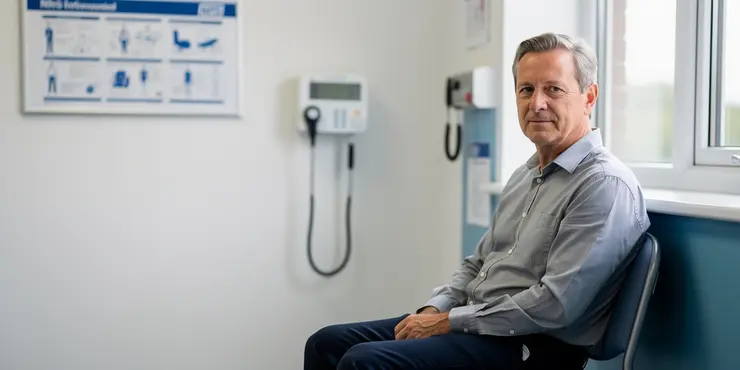
Bipolar disorder: Rod's story | NHS
Relevance: 91%
-

Short Films About Mental Health - Personality Disorders
Relevance: 39%
-
Can eating disorders occur with other mental health conditions?
Relevance: 37%
-
What is an Eating Disorder?
Relevance: 35%
-
What is an eating disorder?
Relevance: 35%
-

Eating disorders: treatment
Relevance: 34%
-

BSL - Diagnosis of panic disorder
Relevance: 33%
-

BSL - Causes of panic disorder
Relevance: 33%
-
Are there preventative measures for eating disorders?
Relevance: 33%
-
How are eating disorders diagnosed?
Relevance: 33%
-
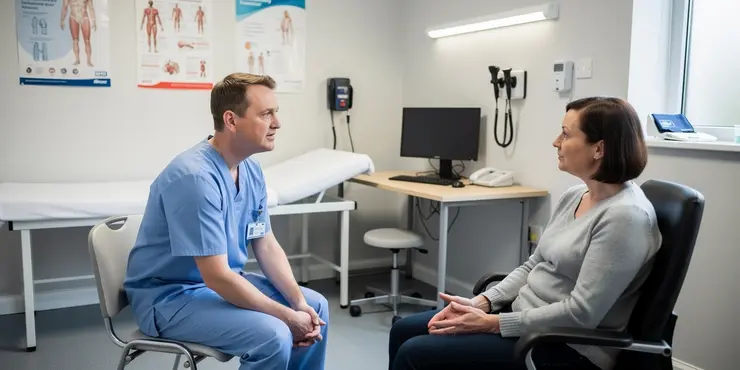
BSL - Introduction to panic disorder
Relevance: 33%
-
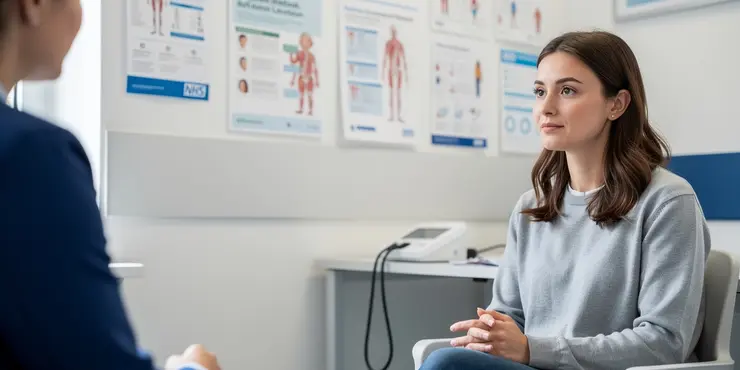
The treatment approach for an eating disorder
Relevance: 33%
-

BSL - Treatment of panic disorder
Relevance: 33%
-
Can eating disorders be treated?
Relevance: 33%
-

BSL - Symptoms of panic disorder
Relevance: 33%
-
Who is at risk for developing an eating disorder?
Relevance: 32%
-
Are eating disorders only about food?
Relevance: 32%
-
What are the main types of eating disorders?
Relevance: 31%
-

What is seasonal affective disorder - or SAD?
Relevance: 31%
-
What are common symptoms of eating disorders?
Relevance: 31%
-
Is it possible to recover from an eating disorder?
Relevance: 31%
-
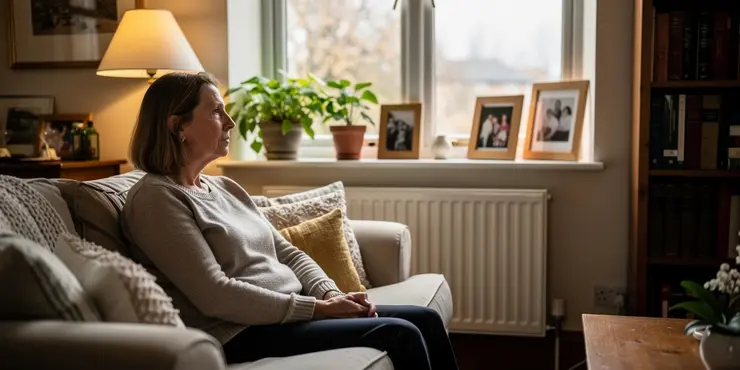
Who is at risk of developing SAD?
Relevance: 30%
-
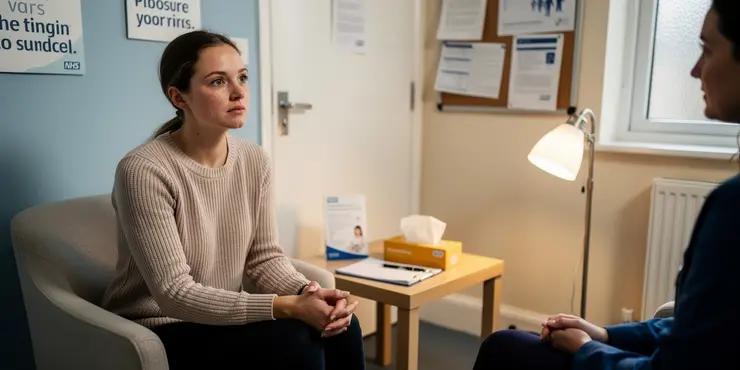
How do eating disorders affect mental health?
Relevance: 30%
-

What is the impact of eating disorders on physical health?
Relevance: 30%
-
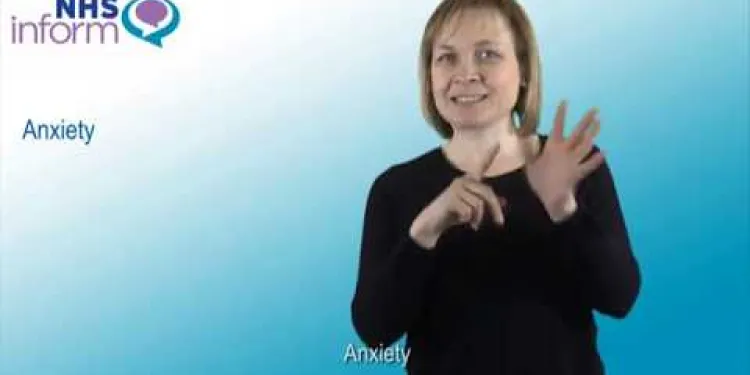
Generalised anxiety disorder (GAD)
Relevance: 30%
-
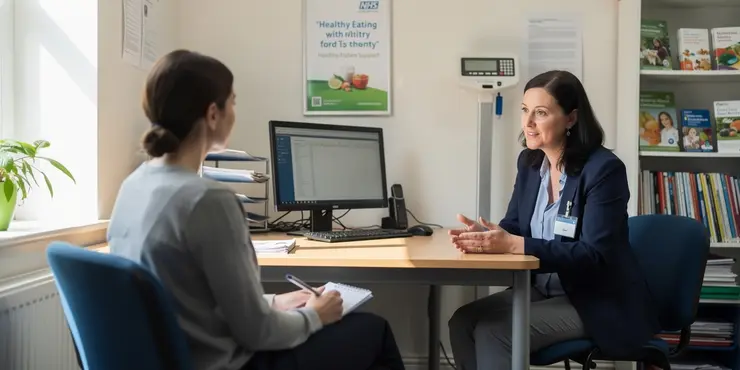
Jess Rann - Specialist Eating Disorders Dietitian
Relevance: 30%
-
What is the role of therapy in treating eating disorders?
Relevance: 30%
-
What are the long-term effects of untreated eating disorders?
Relevance: 30%
-
What are some common myths about eating disorders?
Relevance: 30%
-
What are the early warning signs of an eating disorder?
Relevance: 29%
-
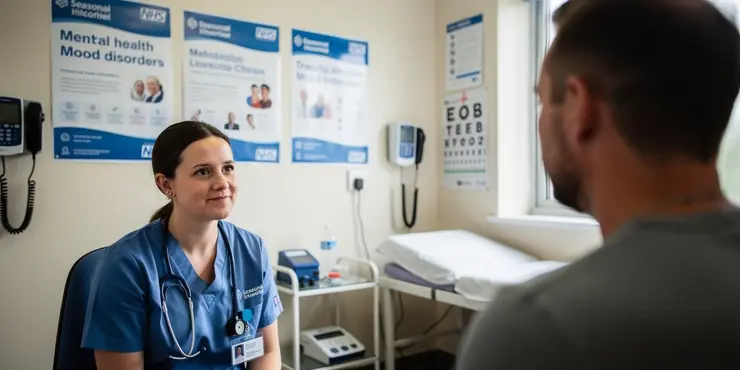
How common is Seasonal Affective Disorder?
Relevance: 29%
-
What is body dysmorphia and how is it related to eating disorders?
Relevance: 29%
-
How can someone seek help for an eating disorder?
Relevance: 29%
-

What is Seasonal Affective Disorder (SAD)?
Relevance: 28%
-

Steve Green tells his story on living with a hoarding disorder
Relevance: 28%
-

What is Seasonal Affective Disorder? (SAD)
Relevance: 28%
-
How can someone help a loved one with an eating disorder?
Relevance: 27%
-

BSL - Panic disorder: things you can do to help yourself
Relevance: 27%
-
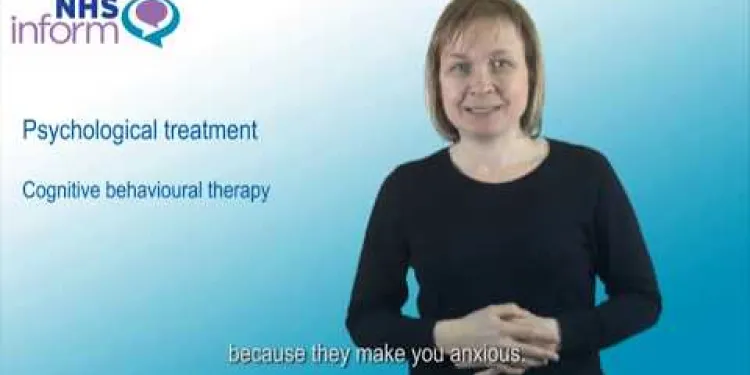
Treating generalised anxiety disorder (GAD)
Relevance: 27%
Living with Bipolar Disorder
Understanding Bipolar Disorder
Bipolar disorder is a mental health condition characterised by significant mood swings, which include emotional highs (mania or hypomania) and lows (depression). In the UK, it affects about one in every 100 people at some point in their life. These mood swings can have a profound impact on daily life, relationships, and overall well-being.
Recognising Symptoms
Symptoms of bipolar disorder can vary widely. During manic phases, individuals may feel euphoric, have increased energy, reduced need for sleep, and engage in risky behaviours. Conversely, during depressive episodes, they may feel sad, hopeless, experience fatigue, and have trouble concentrating. It is crucial to identify these symptoms early to seek appropriate medical support.
Treatment Options
In the UK, treatment for bipolar disorder typically involves a combination of medication and psychotherapy. Medications, such as mood stabilisers, antipsychotics, and antidepressants, can help manage symptoms. Talking therapies like Cognitive Behavioural Therapy (CBT) can also be beneficial in helping individuals understand and manage their mood swings.
Support Systems
Building a strong support network is essential. Friends, family, and support groups can provide emotional backing and practical assistance. Organisations such as Bipolar UK offer resources, support groups, and advice for those living with the condition, as well as for their carers.
Lifestyle and Self-Care
Maintaining a healthy lifestyle can significantly impact the management of bipolar disorder. Regular exercise, a balanced diet, and sufficient sleep play a crucial role in stabilising moods. Mindfulness practices and stress management techniques can also be beneficial in reducing the severity and frequency of mood swings.
Conclusion
Living with bipolar disorder presents unique challenges, but with proper treatment, support, and self-care, individuals can manage their symptoms and lead fulfilling lives. Education and awareness about the condition are vital in reducing stigma and providing understanding and compassion towards those affected.
Living with Bipolar Disorder
Understanding Bipolar Disorder
Bipolar disorder is a mental health problem. It causes big changes in how a person feels. Sometimes they feel very happy and full of energy. Other times they feel very sad and tired. In the UK, 1 out of 100 people have this at some time in their life. These changes can affect everyday life and relationships.
Recognising Symptoms
Symptoms of bipolar disorder can be different for each person. When in a "high" mood, a person may feel very happy, have lots of energy, not need much sleep, and do risky things. When in a "low" mood, a person may feel very sad, tired, and have trouble focusing. It is important to notice these signs early and get help from a doctor.
Treatment Options
In the UK, bipolar disorder is treated with medicine and therapy. Medicines can help control the mood changes. Talking therapies like Cognitive Behavioural Therapy (CBT) can help people understand and manage their feelings better.
Support Systems
Having support from friends and family is important. Support groups can also help. They can give advice and share experiences. Organisations like Bipolar UK offer help and information for people with bipolar disorder.
Lifestyle and Self-Care
Living healthily can help manage bipolar disorder. Exercising regularly, eating healthy food, and getting enough sleep are important. Practices like mindfulness and ways to deal with stress can also help reduce mood swings.
Conclusion
Living with bipolar disorder can be challenging. But with the right treatment, support, and self-care, people can manage their symptoms. Learning more about the condition helps reduce misunderstandings and gives support to those affected.
Frequently Asked Questions
What is bipolar disorder?
Bipolar disorder is a mental health condition characterised by extreme mood swings that include emotional highs (mania or hypomania) and lows (depression).
How is bipolar disorder diagnosed?
Bipolar disorder is diagnosed through a combination of physical exams, psychiatric assessments, and a review of your mood history, often using criteria from the Diagnostic and Statistical Manual of Mental Disorders (DSM-5).
What are the main types of bipolar disorder?
There are several types, including Bipolar I Disorder, Bipolar II Disorder, Cyclothymic Disorder, and other specified and unspecified bipolar and related disorders.
What triggers bipolar episodes?
Triggers can include stress, lack of sleep, seasonal changes, substance abuse, and significant life events. It's important to identify personal triggers to manage the condition effectively.
How can bipolar disorder be treated?
Bipolar disorder can be treated through a combination of medications (such as mood stabilisers and antipsychotics), psychotherapy (like cognitive-behavioural therapy), lifestyle changes, and support networks.
Is there a cure for bipolar disorder?
While there is no cure for bipolar disorder, it is a manageable condition with the right treatment and lifestyle adjustments.
How does bipolar disorder affect daily life?
The disorder can impact various aspects of daily life, including work, relationships, and overall well-being. Individuals may experience extreme mood swings that affect their ability to function normally.
What support is available for people with bipolar disorder in the UK?
In the UK, support is available through the NHS, mental health charities like Mind and Bipolar UK, and community support groups. These organisations offer resources, counselling, and peer support.
Can lifestyle changes help manage bipolar disorder?
Yes, healthy lifestyle changes such as regular exercise, a balanced diet, maintaining a sleep routine, and reducing stress can help manage the symptoms of bipolar disorder.
How does bipolar disorder affect relationships?
Bipolar disorder can strain relationships due to unpredictable mood swings, but with open communication, education, and support, relationships can be maintained and even strengthened.
What should I do if I suspect I have bipolar disorder?
If you suspect you have bipolar disorder, it is important to seek help from a healthcare professional, such as your GP, who can refer you to a psychiatrist for a thorough assessment.
Can children have bipolar disorder?
Yes, children and teenagers can develop bipolar disorder, although it can be challenging to diagnose in younger age groups due to overlapping symptoms with other conditions.
How often do mood swings occur in bipolar disorder?
The frequency of mood swings varies widely among individuals. Some people experience them frequently, while others may go long periods without significant mood changes.
Can people with bipolar disorder lead normal lives?
Absolutely. With effective treatment and support, many people with bipolar disorder lead fulfilling, productive lives.
Are there any famous people with bipolar disorder?
Yes, several well-known individuals have been open about their experiences with bipolar disorder, including Stephen Fry, Catherine Zeta-Jones, and Demi Lovato. Their stories can provide insight and hope to others living with the condition.
What is bipolar disorder?
Bipolar disorder is an illness of the brain. It makes people feel very happy and very sad in big swings. These feelings are called "mood swings."
When a person feels very happy, it is called a "high" or "mania." They might have lots of energy and do things quickly.
When a person feels very sad, it is called a "low" or "depression." They might feel very tired and move slowly.
People with bipolar disorder can get help from doctors. There are medicines and talking therapies that can help.
It is important to talk to a doctor or a mental health helper if you think you have bipolar disorder.
Here are some tools and tips that can help:
- Write in a diary about your feelings. This can help you understand how you feel.
- Talk to someone you trust, like a friend or family member, about your feelings.
- Use a mood-tracking app to help keep track of your feelings over time.
Bipolar disorder is when someone has big changes in how they feel. They can feel very happy and excited (this is called mania or hypomania) or very sad (this is called depression).
How do doctors know if someone has bipolar disorder?
Doctors find out if someone has bipolar disorder by doing a few things. First, they check how your body is doing with a physical exam. Then, they ask questions to understand how you feel and think. They also look at how your moods have been in the past. To help them, they use a guide called the DSM-5.
If reading is hard, you can use tools like audiobooks or apps that read text out loud. Try drawing or making notes with pictures to help remember information. It's also okay to ask someone you trust to explain tricky parts.
What are the main types of bipolar disorder?
Bipolar disorder is a mood illness. It makes people feel very happy or very sad.
There are three main types of bipolar disorder:
- Bipolar I Disorder: This means having big mood changes. People feel very happy for at least one week (called mania) and very sad for at least two weeks (called depression).
- Bipolar II Disorder: This means having smaller mood changes. People have some happy times (less than mania) called hypomania, but they also have sad times (depression).
- Cyclothymic Disorder: This means having ups and downs, but less strong than Bipolar I and II. The happy and sad times are not as big.
Supportive Tools: Picture cards and mood charts can help understand feelings. Talking to a doctor can also help.
There are different kinds of bipolar disorder. They are called Bipolar I Disorder, Bipolar II Disorder, Cyclothymic Disorder, and some other types that do not have a specific name.
If you find it hard to read, here are some tips that might help:
- Read slowly and take breaks when you need to.
- Use a ruler or your finger to follow the words as you read.
- Listen to audiobooks or use text-to-speech tools to hear the words.
- Ask someone to read with you and talk about what it means.
What starts bipolar episodes?
Bipolar episodes are times when a person with bipolar disorder feels very up or very down.
Things that might start these episodes can include:
- Changes in sleep, like sleeping too much or too little.
- Big stress, like losing a job or a big fight with a friend.
- Drugs or drinking alcohol.
- Changes in the weather or seasons.
- Skipping medicines or not taking the right dose.
To help manage bipolar disorder, try these tips:
- Keep a regular sleep schedule.
- Talk about your feelings with someone you trust.
- Avoid alcohol and drugs.
- Take your medicine as the doctor says.
- Use a diary to track how you feel every day.
There are things that can make you feel worse. Some examples are stress, not enough sleep, changes in the weather, using drugs or alcohol, and big changes in your life. It's important to know what makes you feel worse so you can feel better.
How can we help someone with bipolar disorder?
Bipolar disorder is a mental health problem. It can make people feel very happy and full of energy or very sad and tired.
Here are some ways to help treat bipolar disorder:
- Talk to a doctor: Doctors can help. They know about medicines and other ways to help.
- Take medicine: Medicine can help people feel better. It's important to take it the way the doctor says.
- Talk to someone: Talking to a therapist or counselor can help. They listen and give support.
- Have a routine: Doing things at the same time every day can help, like going to bed and waking up at the same time.
- Ask family and friends for help: They can support and help with daily activities.
It's important to get help and talk to someone if you or someone you know has bipolar disorder.
Bipolar disorder is a kind of sickness that affects how you feel. There are ways to help you feel better:
- You can take medicine. Some are called mood stabilisers and some are called antipsychotics. These medicines help balance your feelings.
- Talking to someone like a therapist can help too. Special talking sessions like cognitive-behavioural therapy are useful.
- Changing some habits, like eating healthy, sleeping well, and exercising, can make you feel better.
- Having friends and family to talk to is important. They can listen and support you.
Some tools and techniques that might help are writing in a journal, using reminder apps for taking medicine, and joining a support group where you can talk to others.
Can bipolar disorder be made better?
Bipolar disorder can't be cured, but you can manage it. You need the right treatment and lifestyle changes to help.
How does bipolar disorder affect daily life?
Bipolar disorder can change how you feel on different days. Some days you might feel very happy and full of energy. Other days you might feel very sad and tired. This can make it hard to do everyday things like going to school or playing with friends.
Here are some things that might help you:
- Try to have a routine. Doing the same things each day can help.
- Talk to someone you trust, like a parent or a teacher, if you’re feeling upset.
- Use a calendar or planner to remember important things.
- Practice deep breathing or relaxing exercises when you feel stressed.
This problem can make everyday life hard. It can change how people work, talk to friends, and feel happy. People might have big changes in their mood, which can make it tough to do normal things.
What help can people with bipolar disorder get in the UK?
If you have bipolar disorder, there are many ways to get help in the UK. Here are some things that can help:
- Doctors and nurses: You can talk to your doctor or nurse about how you are feeling. They can give you advice and medicine if you need it.
- Therapy: Talking to a therapist can help you understand your feelings and find ways to feel better.
- Support groups: These are groups where you can meet other people with bipolar disorder. You can share experiences and help each other.
- Charities: There are charities that help people with bipolar disorder. They can give you information and support.
It's important to talk to someone if you are having a hard time. You're not alone, and there are people who want to help you.
You can also use tools like reminder apps to help you remember your appointments and medications.
In the UK, help is available from the NHS, charities like Mind and Bipolar UK, and groups in your community. These places give you information, someone to talk to, and support from people who understand you.
Can changes in everyday habits help with bipolar disorder?
Yes, living a healthy life can help with bipolar disorder. This means doing things like exercising often, eating good food, sleeping well, and finding ways to feel less stressed.
How does bipolar disorder affect friendships and relationships?
Bipolar disorder is a health condition. It can make people's moods change a lot. Sometimes they are very happy and excited. Other times, they may feel very sad and tired.
These mood changes can make friendships and relationships hard. When a person is very happy or very sad, it can be tough for others to understand them. This can lead to arguments or hurt feelings.
It's important to talk openly and listen to each other. This helps everyone understand what is happening.
Here are some ways to help:
- Use kind words when talking.
- Tell each other how you feel.
- If things get too hard, talk to a doctor or counselor. They can help.
- There are groups for people with bipolar and their friends. These groups can be helpful.
Bipolar disorder can make relationships hard because of sudden mood changes. But talking openly, learning about it, and getting support can help keep relationships strong, and maybe even make them better.
What to do if you think you have bipolar?
If you think you have bipolar, here are some steps you can take:
- Talk to a Doctor: Speak with a doctor or a mental health professional. They can help you understand what you are feeling.
- Keep a Mood Diary: Write down how you feel every day. This can help your doctor understand your feelings better.
- Ask for Help: Talk to someone you trust, like a family member or friend.
- Take Care of Yourself: Try to eat healthy food, sleep well, and do things that make you happy.
If you need more help, you can look for online support groups or apps that help with mood tracking.
If you think you might have bipolar disorder, it is very important to talk to a doctor. You can start by seeing your family doctor, who can help you see a special doctor called a psychiatrist.
Can kids have bipolar disorder?
Yes, kids can have bipolar disorder.
Bipolar disorder makes your feelings change a lot. Sometimes you feel very happy and full of energy. Other times you might feel very sad and tired.
If you think a child might have bipolar disorder, talk to a doctor. They can help you understand what is going on.
Using calm voices and pictures might help kids talk about their feelings.
Books and stories about feelings can also help kids understand.
Yes, kids and teenagers can have bipolar disorder. It can be hard to know for sure because the signs look like other illnesses.
How often do mood swings happen in bipolar disorder?
Bipolar disorder can make a person's mood change a lot. These mood changes are called "mood swings." Sometimes, they feel very happy or excited. Other times, they feel very sad or down.
The mood swings can happen often, or sometimes not as often. It is different for each person. Some people might have mood swings every week. Others might have them every few months.
Tools like a mood tracker can help. Writing down feelings in a journal every day can help you see patterns or changes.
How often people have mood swings is different for everyone. Some people have them a lot, but others might go a long time without big changes in their mood.
Can people with bipolar disorder live normal lives?
Yes, people with bipolar disorder can live normal lives. They might need help from doctors and medicine. Therapy and talking to someone can help too.
Tools that can help:
- Taking medicine from the doctor.
- Talking to a counselor or therapist.
- Having a daily routine and getting enough sleep.
- Asking friends and family for support.
Yes, they can. With good help and support, people with bipolar disorder can live happy and busy lives.
Do any famous people have bipolar disorder?
Yes, some famous people do have bipolar disorder.
Bipolar disorder is a mental health condition. It can make people feel very happy and then very sad.
Some famous people with bipolar disorder are:
- Carrie Fisher - She was in the Star Wars movies.
- Demi Lovato - She is a singer and actress.
- Stephen Fry - He is a comedian and writer.
If you want to learn more about bipolar disorder, you can talk to a doctor or look for information online.
Using pictures or videos can help you understand better.
Yes, some famous people have talked about having bipolar disorder. These people are Stephen Fry, Catherine Zeta-Jones, and Demi Lovato. Their stories can help others understand and feel hopeful about living with bipolar disorder.
Useful Links
This website offers general information and is not a substitute for professional advice.
Always seek guidance from qualified professionals.
If you have any medical concerns or need urgent help, contact a healthcare professional or emergency services immediately.
Some of this content was generated with AI assistance. We’ve done our best to keep it accurate, helpful, and human-friendly.
- Ergsy carfully checks the information in the videos we provide here.
- Videos shown by Youtube after a video has completed, have NOT been reviewed by ERGSY.
- To view, click the arrow in centre of video.
- Most of the videos you find here will have subtitles and/or closed captions available.
- You may need to turn these on, and choose your preferred language.
- Go to the video you'd like to watch.
- If closed captions (CC) are available, settings will be visible on the bottom right of the video player.
- To turn on Captions, click settings .
- To turn off Captions, click settings again.
More Items From Ergsy search
-

Living with Bipolar Disorder
Relevance: 100%
-

Bipolar disorder: Rod's story | NHS
Relevance: 91%
-

Short Films About Mental Health - Personality Disorders
Relevance: 39%
-
Can eating disorders occur with other mental health conditions?
Relevance: 37%
-
What is an Eating Disorder?
Relevance: 35%
-
What is an eating disorder?
Relevance: 35%
-

Eating disorders: treatment
Relevance: 34%
-

BSL - Diagnosis of panic disorder
Relevance: 33%
-

BSL - Causes of panic disorder
Relevance: 33%
-
Are there preventative measures for eating disorders?
Relevance: 33%
-
How are eating disorders diagnosed?
Relevance: 33%
-

BSL - Introduction to panic disorder
Relevance: 33%
-

The treatment approach for an eating disorder
Relevance: 33%
-

BSL - Treatment of panic disorder
Relevance: 33%
-
Can eating disorders be treated?
Relevance: 33%
-

BSL - Symptoms of panic disorder
Relevance: 33%
-
Who is at risk for developing an eating disorder?
Relevance: 32%
-
Are eating disorders only about food?
Relevance: 32%
-
What are the main types of eating disorders?
Relevance: 31%
-

What is seasonal affective disorder - or SAD?
Relevance: 31%
-
What are common symptoms of eating disorders?
Relevance: 31%
-
Is it possible to recover from an eating disorder?
Relevance: 31%
-

Who is at risk of developing SAD?
Relevance: 30%
-

How do eating disorders affect mental health?
Relevance: 30%
-

What is the impact of eating disorders on physical health?
Relevance: 30%
-

Generalised anxiety disorder (GAD)
Relevance: 30%
-

Jess Rann - Specialist Eating Disorders Dietitian
Relevance: 30%
-
What is the role of therapy in treating eating disorders?
Relevance: 30%
-
What are the long-term effects of untreated eating disorders?
Relevance: 30%
-
What are some common myths about eating disorders?
Relevance: 30%
-
What are the early warning signs of an eating disorder?
Relevance: 29%
-

How common is Seasonal Affective Disorder?
Relevance: 29%
-
What is body dysmorphia and how is it related to eating disorders?
Relevance: 29%
-
How can someone seek help for an eating disorder?
Relevance: 29%
-

What is Seasonal Affective Disorder (SAD)?
Relevance: 28%
-

Steve Green tells his story on living with a hoarding disorder
Relevance: 28%
-

What is Seasonal Affective Disorder? (SAD)
Relevance: 28%
-
How can someone help a loved one with an eating disorder?
Relevance: 27%
-

BSL - Panic disorder: things you can do to help yourself
Relevance: 27%
-

Treating generalised anxiety disorder (GAD)
Relevance: 27%


